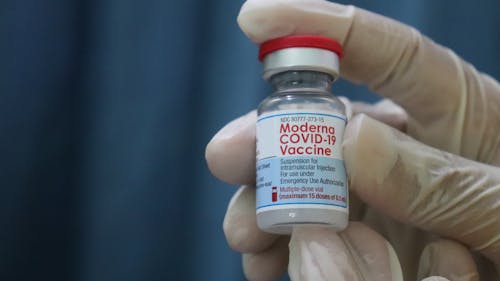Survey finds vaccine hesitancy stems from safety concerns, institutional distrust

A recent report by The COVID States Project highlighted the main reasons individuals in the U.S. are still choosing to remain unvaccinated against the coronavirus disease (COVID-19) at this point in the pandemic: concerns about the vaccine’s safety and distrust of institutions.
Earlier in the pandemic when vaccines had only recently become available to the public, unvaccinated individuals faced logistical obstacles, said Katherine Ognyanova, an assistant professor at the School of Communication and Information who co-authored the report.
Before getting vaccinated, individuals had to consider a multitude of factors: if they were eligible, where their nearest vaccination site was, whether doses were available and whether they could take off work or find childcare for the duration of the appointment, she said.
Ognyanova said the situation is different now that unvaccinated individuals have other concerns.
“Nine out of 10 unvaccinated respondents in our survey had concerns about the safety and potential side effects of the vaccine,” Ognyanova said. “Surprisingly, close to a third were worried they might catch COVID-19 from the vaccine, which is not a possibility.”
Thirty-five percent of unvaccinated survey respondents cited possible adverse side effects from the vaccine, such as blood clots, as a reason for not getting vaccinated, according to the report.
Based on recommendations by the large majority of U.S. health professionals, COVID-19 vaccines are safe and effective against the disease, Ognyanova said. Compared to the risk associated with catching COVID-19 and developing serious symptoms, she said getting vaccinated is a better option than not.
Ognyanova said that another factor pushing individuals to stay unvaccinated is a lack of trust in institutions such as the government, media and health care system. She said statistical analysis has determined that an individual's level of confidence in institutions is an effective predictor of whether they will get vaccinated.
“People who don’t trust the government and mainstream media are both more likely to be exposed to vaccine misinformation and to be vaccine-resistant,” Ognyanova said.
She said the government is one of the institutions unvaccinated individuals trust the least, as they feel it is exaggerating the dangers of the pandemic and rolling out an experimental vaccine.
Thirty percent of unvaccinated survey respondents said they did not trust the White House at all to do the right thing, compared to 9 percent of vaccinated respondents, according to the report. Fifteen percent of unvaccinated respondents said they have a distrust in the vaccine due to the government and other institutions advocating for it.
Ognyanova said institutions that typically receive high confidence from the public are health care professionals and the scientific community. But the pandemic has affected public trust in them as well, she said.
“Of all groups that we ask about, the ones that enjoy consistently high public trust are doctors and scientists,” Ognyanova said. “Unfortunately, this pandemic and the measures taken to curb the spread of COVID-19 have been very heavily politicized, and so political distrust has a considerable effect on health-related attitudes.”
Between February and June of this year, respondents’ trust in doctors and scientists dropped by 1 percent and 2 percent respectively, according to the report.
Ognyanova said that resistance toward vaccines differs based on demographics and political affiliation. Americans who are older than 65, have higher socioeconomic status, live in urban areas and identify as Democrats are less likely to be vaccine resistant, she said.
Individual states follow these patterns, with more rural or Republican-leaning areas being more resistant to vaccines, Ognyanova said.
The Food and Drug Administration (FDA) fully approved the Pfizer vaccine after the survey was taken, which The COVID States Project has taken into account, she said.
“We are currently completing a new survey wave which will allow us to check for changes in vaccine attitudes before and after the FDA approval of Pfizer vaccines,” Ognyanova said. “I do not expect to see a dramatic shift, but it is possible that some hesitant respondents may feel more confident in the safety and effectiveness of the vaccine.”



